Joseph is hiding from Germany‘s deportation police. He is living in a small room borrowed from a friend, only daring to go out once a week for a secret visit to church.
Even then, he gets a lift from a fellow worshipper rather than braving public transport. ‘I am driven to the church and back,’ he whispers down the phone to me. ‘I cannot go on the tram, the train or the bus because the police may see me. They want to take me to the airport and deport me back to Nigeria.’
Joseph, a talented musician, appears to be a decent man, but he is unlikely to get much sympathy in Germany. The country has turned its back on mass immigration as the economy falters, crime soars and the government shells out ‘refugee-related expenses’, including benefits, of £25 billion a year.
He is among the millions who entered after Chancellor Angela Merkel‘s momentous decision in 2015 to open Germany’s borders to Syrian refugees – and, as it turned out, those of any country who knocked.
One in five of the migrants claim benefits. Nearly half of those who arrived never went to school in their home country or left before passing any exams, so they can only find menial jobs. Two out of three of the female arrivals are unemployed. In schools, teachers are faced with teenagers (some of whom have been here since they were babies) who struggle with the most basic German.
Today, Joseph finds the tables have turned on him. Germany has had a ‘seine Meinung andern’ – a change of mind – after letting in so many migrants. And, like many others, he has gone to ground.
Chancellor Friedrich Merz announced this week that the German welfare state is no longer sustainable for either its own people or the millions of Merkel newcomers. The welcome is over and deportations come top of the political agenda.
Every week, the authorities put migrants on flights to their home countries, some of them the very people greeted by Merkel’s supporters waving banners and balloons ten years ago.
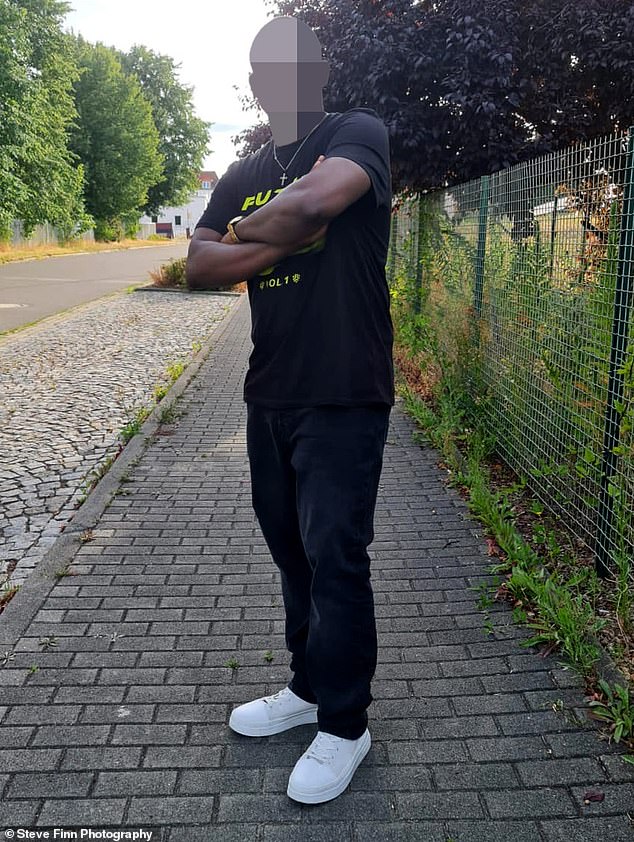
Joseph, pictured, is hiding from Germany’s deportation police. He is living in a small room borrowed from a friend, only daring to go out once a week for a secret visit to church
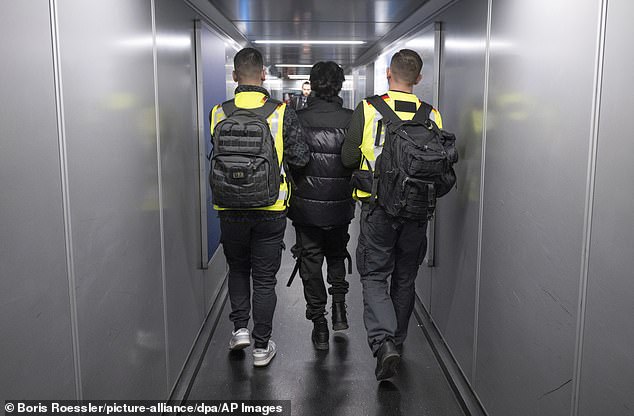
Officers from the Federal Police pictured taking a man on a deportation flight to Pakistan. Germany has turned its back on mass immigration as the economy falters and crime soars
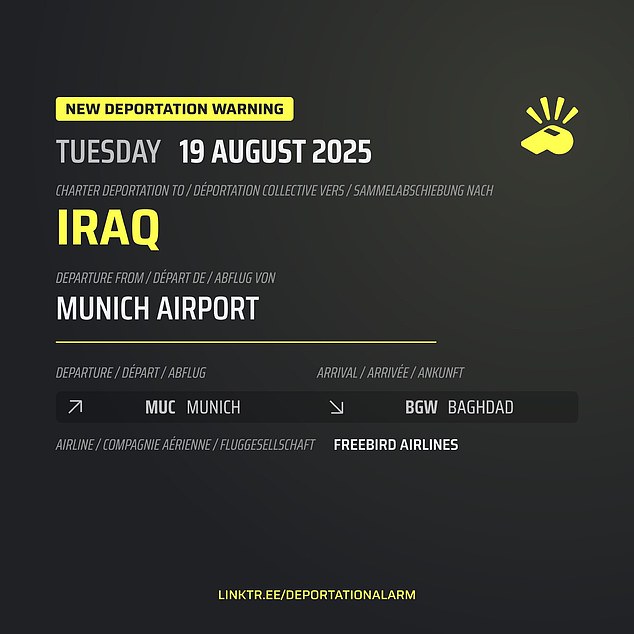
Every week, the authorities put migrants on flights to their home countries (Pictured: A deportation warning)
The Mail has been shown details of recent deportation flight lists. Earlier this month, at 7am, a group of migrants was put on a government-chartered aircraft leaving Frankfurt for Nigeria and Ghana. A day later, another plane left for Serbia and North Macedonia. There have been multiple flights from various German airports to Iraq, Georgia, Bulgaria, Croatia, Serbia, and Moldova.
In August last year came the first flight to Afghanistan carrying away violent criminals, offenders, and terror supporters. Each received £850 in cash to go.
The German government used Middle East intermediaries to arrange the deportation with the Taliban. A further 15,000 Afghanis are now listed for deportation, some of them suspected of terror-linked offences.
Our informant added bitterly: ‘They also hope to deport Syrians despite their country being in turmoil after the recent coup and the fact they were being invited in first. Germany has become a wolf in sheep’s clothing.’
In truth, the deportations are mired in legal red tape. The German government this week, showing frustration, threatened to strip asylum seekers’ of the right to an immigration lawyer in an effort to remove more – and faster. Alexander Throm, a senior MP in the Chancellor’s Christian Democrats party said: ‘Many deportations fail due to various legal obstacles.
‘Also, if people go into hiding or can’t be found, the police may give up trying to arrest them.’
German state TV recently aired a compelling documentary on the reality of deportations by following a team from the Foreigners’ Authority based in Brandenburg, north-east Germany.
The aim of the film was to assure Germans that action is being taken. However, it also revealed a system that is creaking under the weight of the work.
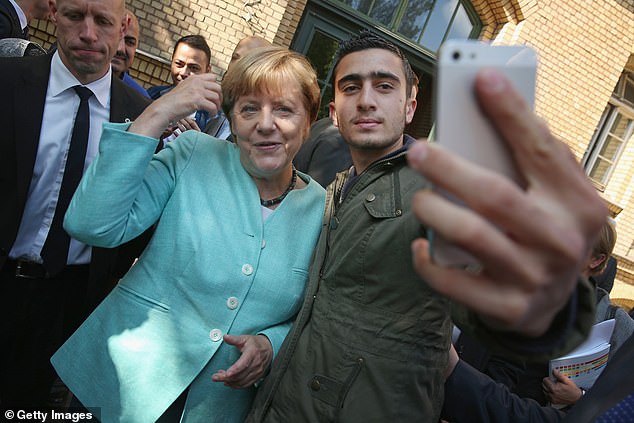
German Chancellor Angela Merkel pictured posing for a selfie with a refugee. Millions entered after the Chancellor’s momentous decision in 2015 to open borders to Syrian refugees
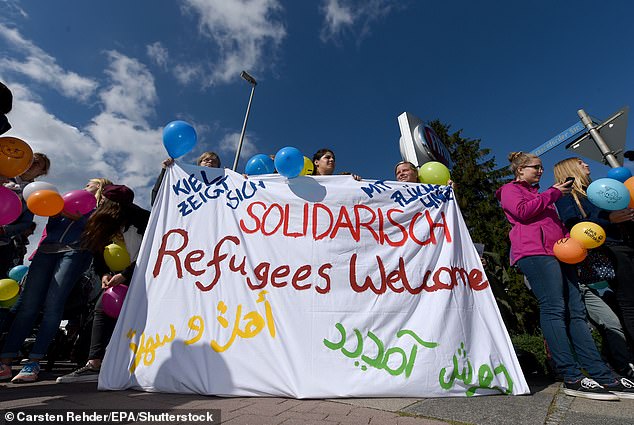
Germany has had a ‘seine Meinung andern’ – a change of mind – after letting in so many migrants (pictured: residents welcoming a bus of refugees in Kiel in 2015)
The men targeted for deportation included a Tunisian drug dealer (chased but never found) and a Chechnyan repeat offender with 64 criminal offences including cocaine use and sharp weapon assault (who for years evaded capture until he was tracked down and put on a court-approved £22,000 flight home, via Russia, surrounded by guards).
Of several cases in the documentary, only one – a passport-less middle-aged Syrian (again among the first of Merkel’s arrivals) – agreed to leave voluntarily.
He had spent most of his time in Germany in prison for assault, as well as the sexual coercion of a minor. Under the deportation deal, his convictions were waived and he received a payout which was handed to him as he landed in Aleppo.
The dramatic push on deportations follows a mass stabbing last year, when three people were killed and eight injured by a Syrian Islamic State jihadi at a festival in the West German city of Solingen.
Issa al H, 27, who claimed asylum in 2022 and lived in a refugee home, deliberately aimed at his victims’ necks after reading terror manuals online, say prosecutors.
During his trial, he admitted triple murder and made a statement saying he is prepared to ‘accept the verdict’ for killing ‘innocents, not infidels’.
This case, and a spate of terror attacks, is swelling anti-migrant sentiment across the political spectrum.
A national poll this week by Germany’s respected Forsa Institute for Social Research and Statistical Analysis showed one in three believe the country may ‘never get control’ of mass migration. More than half say they face problems with migration in towns, rising to a mighty 60 per cent among those living in big cities.
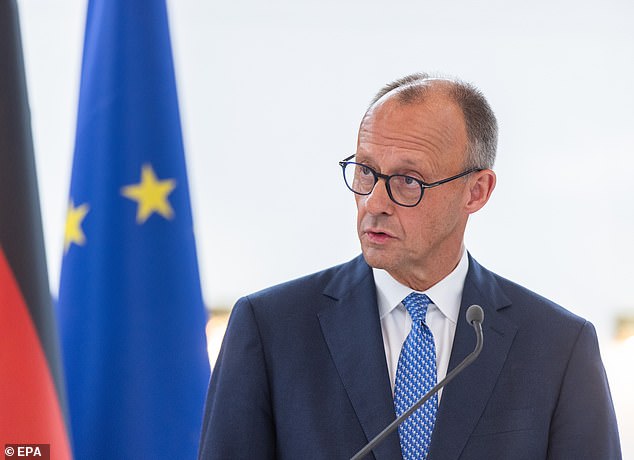
Chancellor Friedrich Merz announced this week that the German welfare state is no longer sustainable for either its own people or the millions of Merkel newcomers
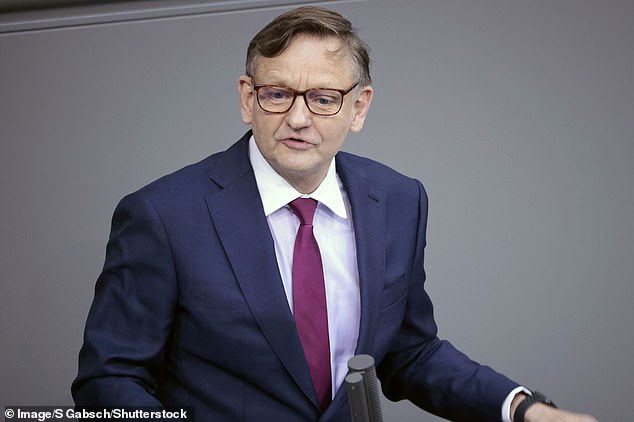
Fiercely anti-migrant AfD, earlier this month, topped a poll as the country’s most popular political party (pictured: Kay Gottschalk of AfD in 2022)
Meanwhile, in hiding, Joseph knows he could be next to go. Like many others who have been refused residency or asylum, he carries a special red card given to him by the German authorities denoting that he is on a ‘watch list’ for deportation.
In Germany, I found many with the same card. One, a Tunisian who was sunbathing in a Leipzig park with his Libyan friends, showed me a picture of the young girl he fathered with a German partner. He hopes that the child, who is only allowed to see him for two hours a day because of his domestic abuse convictions, will provide him with the chance to stay in the country. Like all the others fighting deportation, he is consulting his lawyer.
As for Joseph, he is scared stiff. He faced oppression from Islamic extremists in Nigeria because of his Christianity. But as a skilled construction worker, as well as a musician, he hoped to get a good job when he settled in Leipzig, a city in the formerly communist East Germany.
Even today, despite the waves of migration, it is rare to see an African like Joseph in Leipzig. Unlike more liberal-minded parts of the country, the majority of children in schools here are white Germans or Ukrainian refugees.
The area is run by representatives of Alternative for Germany (AfD), the fiercely anti-migrant party which, earlier this month, topped a poll as the country’s most popular political party.
The AfD’s leader for the area, Christian Kriegel, 69, told me at his city hall office: ‘We said mass migration was a mistake, and now we are vindicated. One magic word should have been used at the borders in 2015. That word was ‘Nein’.
‘Every single day there is a knife attack against local people, or migrants themselves, by those who have come to this country following the call of Mrs Merkel.’
In 2024, Germany deported approximately 20,000 migrants. During the first quarter of this year, 6,151 were sent home, a 28 per cent increase over the same time last year.
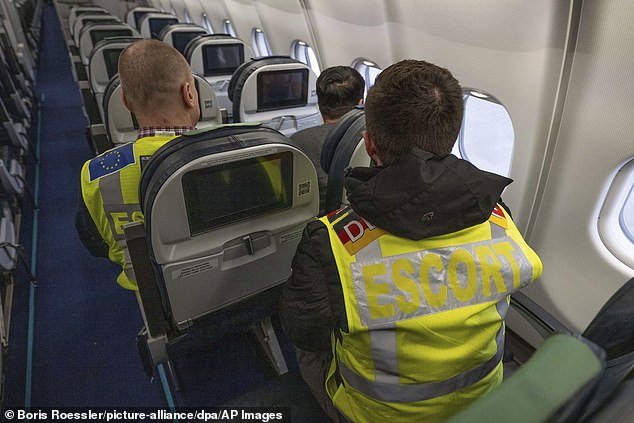
Officers from the German Federal Police and the European border protection agency Frontex pictured on a plane with a man being deported in February
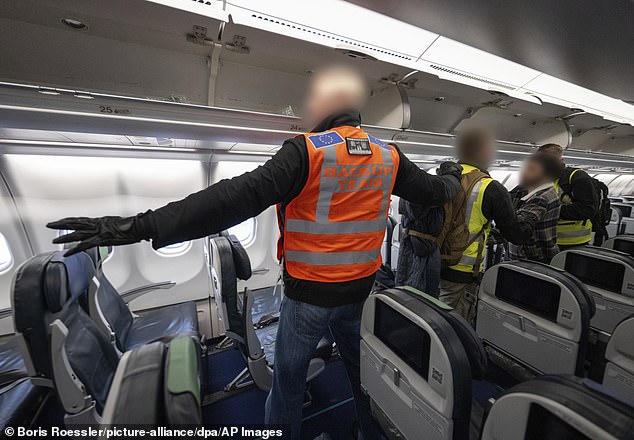
Every week, the authorities put migrants on flights to their home countries, some of them the very people greeted by Merkel’s supporters waving banners and balloons ten years ago
The country has been turning away asylum seekers at its borders since May, it is talking to Rwanda about sending them there, and is expected to do deals with other third countries.
But millions of migrants have successfully claimed asylum in the past decade and, despite the recent crackdown, almost a third (29.7 per cent) of the German population now has a foreign background.
Schools, social housing, and the health service, particularly in western Germany, struggle to cope. Whole swathes of cities are now Arabic-speaking areas with kebab shops, halal butchers, hijab stores and shisha pipe cafes. There is nearly always a nearby mosque for worshippers, as 2,500 have now opened in Germany.
Migrants have been linked to terrorist killings, shootings and sexual assaults, according to the authorities. In February this year, a mother and her two-year-old daughter were killed and another 37 injured when a car was driven into a crowd in Munich by a 24-year-old Afghan asylum seeker.
Bavaria’s premier Markus Soder said the attack, which had ‘a religious motivation’, was a slap in the face for Germans.
‘Something has to change here, and quickly,’ he said of a society which is now becoming dangerously divided into ‘them’ and ‘us’.
In truth, disaster for Mrs Merkel’s mass immigration experiment came soon after it began, almost exactly a decade ago.
On August 31, 2015, she famously proclaimed at a press conference, ‘We can do it’, by which she meant Germany could cope with thousands of migrants a day pouring into the country through its open borders.
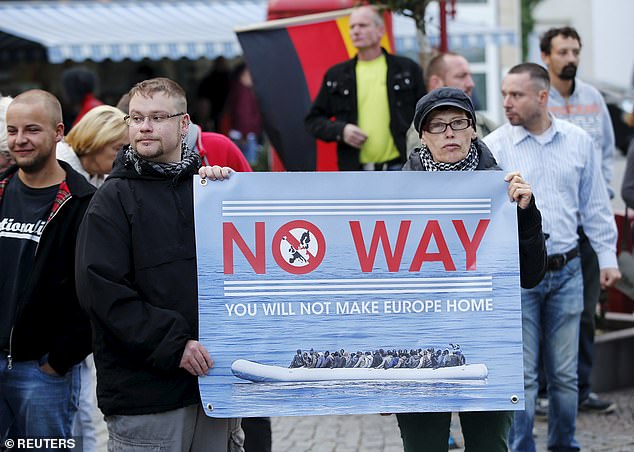
Protesters demonstrating against Mrs Merkel’s policies in 2015. Migrants have since been linked to terrorist killings, shootings and sexual assaults, according to the authorities
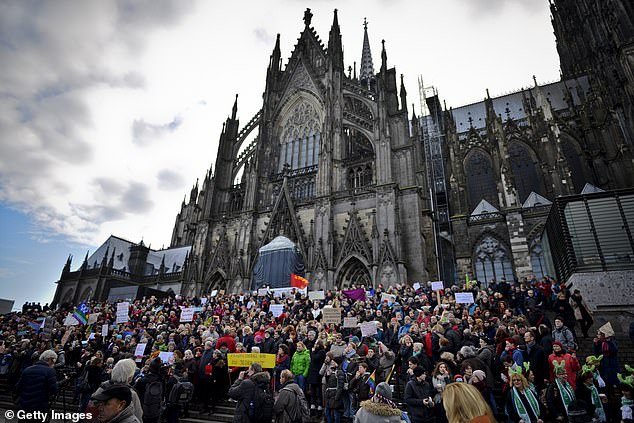
The nightmare was worst in Cologne, whose liberal residents had been enormously in favour of Merkel’s welcome. Outside the city’s landmark Gothic cathedral, a thousand or more men of North African and Arab origin hunted down hundreds of women and girls
Three months later, on New Year’s Eve, Mrs Merkel again reassured her nation over mass immigration. She went on state TV to describe the ‘refugee’ arrivals as ‘an opportunity for tomorrow’.
‘Countries have always benefited from successful immigration, both economically and socially,’ she declared confidently. ‘We will help people who seek safe haven with us.’
Yet even as she spoke, a catastrophe was unfolding. The New Year festivities were scarred by an epidemic of depraved sex attacks in public squares and streets. Thousands of women and girls were targeted by mobs of migrant men.
In Berlin, a female tourist was assaulted by five men in front of the famous Brandenburg Gate. In Hamburg, 50 women complained to police about ‘North African’ men who called them ‘bitches’ and shouted ‘Fiki’ – meaning ‘sex’ – to indicate they wanted to rape them, before chasing them ‘like cattle’.
The nightmare was worst in Cologne, whose liberal residents had been enormously in favour of Merkel’s welcome. Outside the city’s landmark Gothic cathedral, a thousand or more men of North African and Arab origin hunted down hundreds of women and girls. They were chased, cornered, intimately groped or raped before their mobiles and wallets were stolen.
A few days afterwards, I went to the square outside Cologne cathedral and interviewed 18-year-old Michelle, who was attacked with a group of friends. She said sadly and simply: ‘The men were all foreigners, and when we protested, they did not understand us.’
The Cologne police force was accused of hushing up the New Year’s Eve scandal.
It issued an official press release the following day, describing the celebrations as ‘exuberant, but mostly peaceful’.
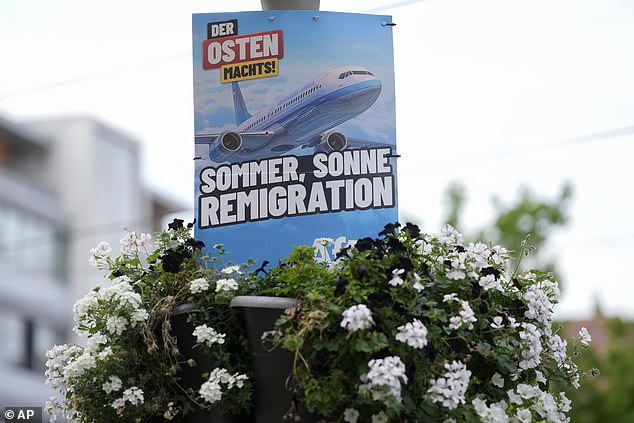
An AfD poster reading ‘summer, sun, remigration’ in 2024. In 2024, Germany deported approximately 20,000 migrants
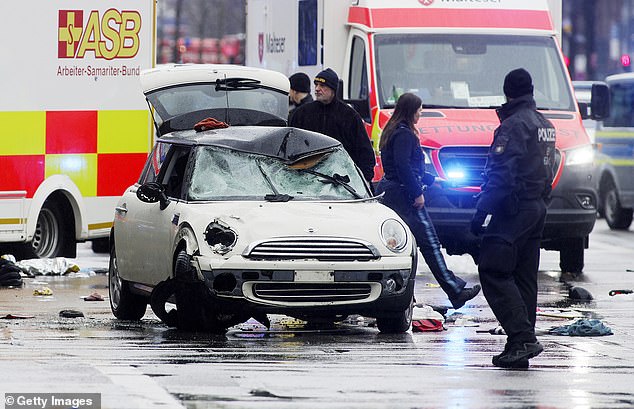
In February this year, a mother and her two-year-old daughter were killed and another 37 injured when a car was driven into a crowd in Munich by a 24-year-old Afghan asylum seeker
For a week afterwards, ministers were silent about the ethnic or migrant backgrounds of the perpetrators, denying initially that they were new arrivals.
A leaked police report revealed the truth that one of the perpetrators had told officers: ‘I am Syrian. You have to treat me kindly. Mrs Merkel invited me.’
Franco Clemens, a social worker then running a Cologne refugee accommodation centre, said later that the night ’caused a paradigm shift in society over the migrants. The welcoming culture was contradicted. Many people who had broadly supported it became fearful.’
Alice Schwarzer, one of Germany’s most famous journalists who has written a best-selling book called Der Schock: Die Silvesternacht In Köln (The Shock: New Year’s Eve in Cologne) agrees that mass assaults on women marked a tipping point. ‘It is the first time that these types of men had tried to drive women out of a public space in Europe,’ she said.
She is editor of Emma, a best-selling feminists’ magazine, and recalled how the switchboard lit up after the abuse perpetrated in Cologne: ‘Our telephone did not stop ringing with calls from women reporting what had happened to them,’ she told me. ‘They had been overwhelmed by men, many North African. Most turned out to be illegal migrants and very new to Germany.’
The cathedral mobs mimicked the sex crimes by packs of men in Cairo’s Tahir Square during Egypt’s 2011 celebrations of the so-called Arab Spring, said Ms Schwarzer. On that occasion, Lara Logan, a CBS reporter, was sexually assaulted. Her clothes were torn off as she was enveloped by a mob of at least 200 men, many of whom took pictures on their mobiles of her naked body. She described how ‘for an extended period of time, they raped me with their hands’.
Ms Schwarzer believes Cologne’s cathedral square was targeted because ‘it is one of the biggest symbols of Christianity in Germany’. ‘I was told by a friend who worked there that, during the 6pm Mass on New Year’s Eve, firecrackers were already being thrown at the cathedral windows. There was so much noise outside they thought the worshippers were going to panic.’
Kay Gottschalk is the MP for North Rhine-Westphalia, which covers Cologne. His party, the Right-wing AfD, warned back in 2015 that uncontrolled immigration would endanger women and the German economy. In those days, the party was polling at just 3 per cent. ‘Few dared say they supported us. Those days of silence are finished,’ he said to me last week. ‘People now want change in Germany.’
Which surely means that deportations will be stepped up.